Step 12: Living a Spiritual Life in the World
In Step 10, we put in place strategies for maintaining our interconnections with others; in Step 11, we did the same for our interconnection with God. Now, we need to adopt a methodology to ensure that our interconnection with ourselves—past, present, and future—is given a chance to develop and grow. That’s where Step 12 comes into play.
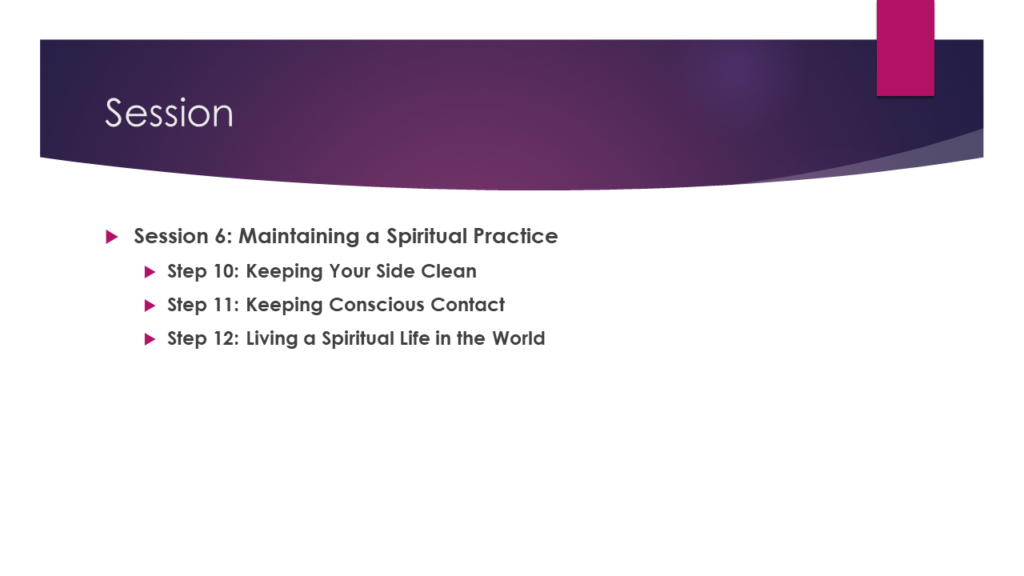
Computers require a user interface to allow people to connect to the electronics within and vice versa. You might think that maintaining our personal integrity is a wholly inside job, but it’s not. Like the computer, our personalities—our characters—represent the interface between God and the world. Our spiritual life has an impact on the world, and the world helps to inform our spiritual lives. Step 12 provides us with guidance, helping us to maintain that healthy interface. Let’s see how.
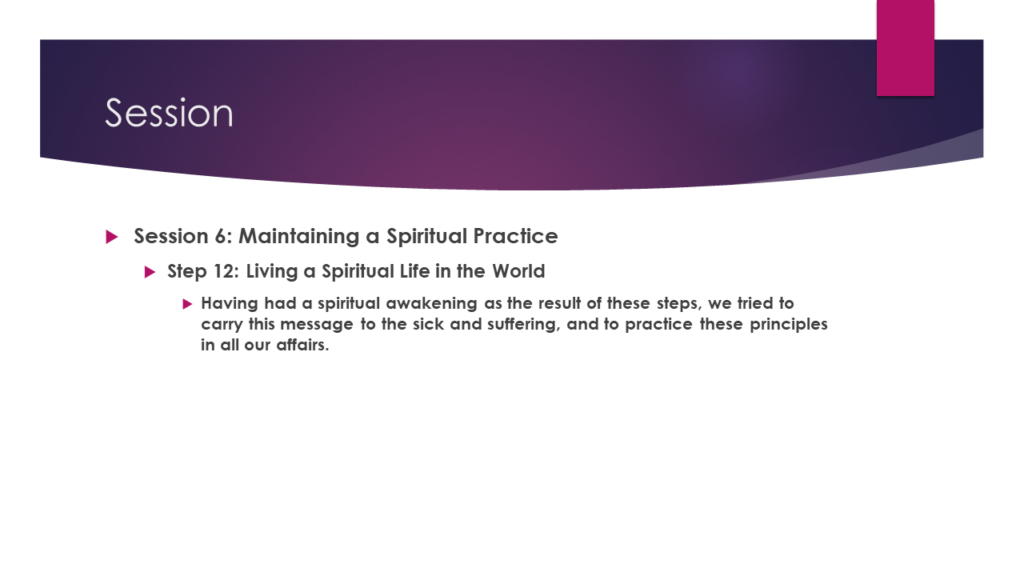
“Having had a spiritual awakening as the result of these steps, we tried to carry this message to the sick and suffering, and to practice these principles in all our affairs.” This step reminds us of the purpose of these twelve steps: that is to create in us a spiritual awakening. Were we spiritually asleep? Certainly. Every human life is the story of a gradual awakening. We awaken to the potential of our world as we awaken to our own personal potential. As we approach adulthood, we should also be approaching spiritual maturity, however, for many reasons, oftentimes that doesn’t happen. We stumble into adulthood half-asleep. It helps to have a roadmap to guide us toward an awakening into spiritual health and wholeness. That’s what we’ve been doing over the course of these six sessions. The steps can be used for many other purposes, but their primary purpose is to stimulate a spiritual awakening in us.
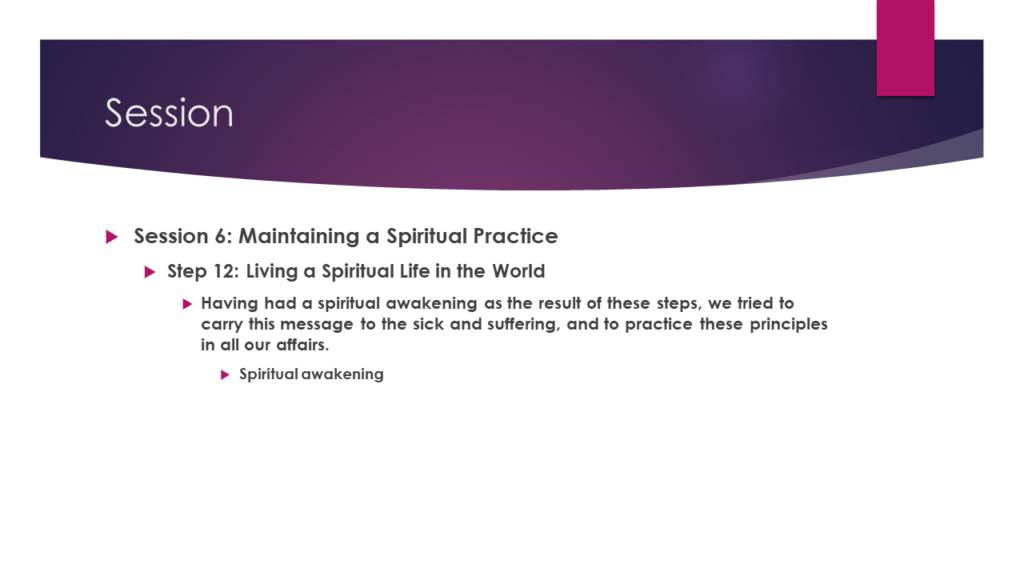
What does a “spiritual awakening” look like on the inside? As we take a fresh look at our self-image, we can see obvious changes in how we feel. Things that seemed beyond our capabilities now seem possible. Our emotions, once stifled by guilt and shame, anger and fear, now feel freer and more open to the full range of human experience. We can feel true joy and true sorrow. Significantly, we are now open to the possibility that God is meeting us halfway. What once we dismissed as coincidences now appear like “God winks” As the static in our brains starts to quiet, we find whisperings of a wisdom that seems almost foreign and beyond us. Could God actually be communicating with us, now that we’re open to listening? Maybe that interconnection with God is real after all.
And the world—once a dangerous and threatening place where we felt like aliens—now, maybe for the first time, looks and feels like home. Accepting reality as it is—rather than as we’d like it to be—and surrendering to the will of God—rather than pretending that we needed to do it all alone—has left us with feelings we’ve never before experienced: gratitude for the past and present and hope for the future. We can make our own the simple prayer of Dag Hammarskjöld as we pray, “Dear God, for all that has been, thanks; for all that will be, yes!”
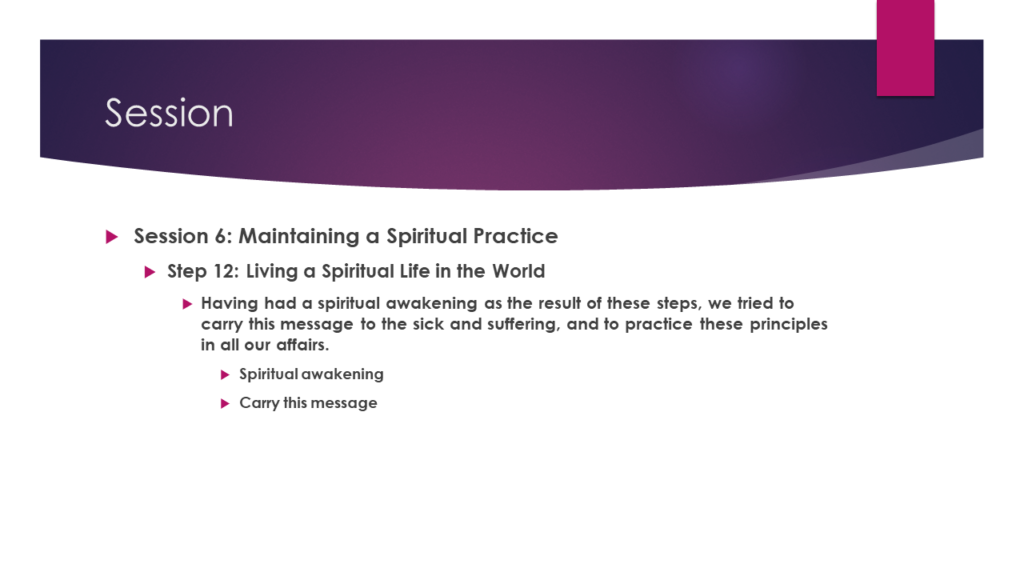
“Carry this message?” Okay, now this sounds suspicious. Does this step mean that we need to become some sort of twelve-step evangelists, knocking on doors and handing out pamphlets? Not at all. There are two ways that we can spread the message that a healthy spirituality works. First and foremost, it’s when people who knew us before notice a puzzling change in us. We’ve relaxed. With our resentments and fears addressed, our anxiety level has dropped. We’re no longer defensive or belligerent, but compassionate and accommodating. We’ve gone from “cold and prickly” people to “warm and fuzzy.” They see in us a sense of honesty, acceptance, unselfishness, peace of mind, and love that they’ve never seen before. “What’s behind the change?” they ask themselves. Perhaps they even think it’s too good to be true. Their curiosity draws them to us. Perhaps they want some of what we’ve got for themselves.
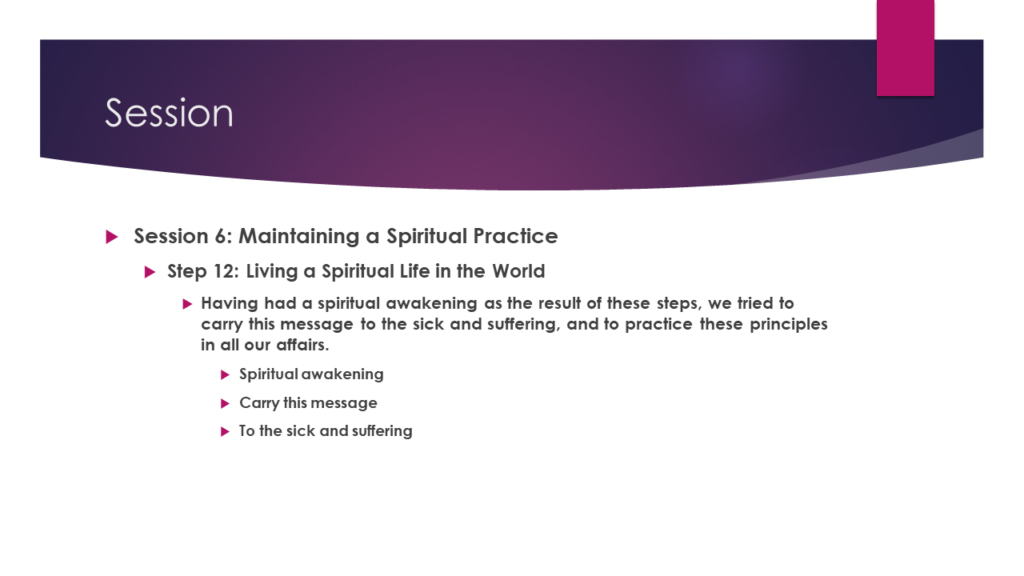
Secondly, we’re no longer caught up in selfish self-interest. We’ve found an energy within us that’s allowed us to take an interest in others and to put our interest into action. We’re no longer hanging back as mere observers of life because spirituality drives us to become active participants. We’re no longer the center of our concerns. We’re more observant, and therefore more capable and willing to see the needs of others and to put ourselves out for them. We become the support and encouragement that others need—the sick and suffering, physically, mentally, emotionally, economically, socially, and spiritually. No longer treating others as adversaries, we’re now capable of entering into partnerships with them, neither leading nor following, but working side-by-side. Our willingness to be of service to others and to our world puts us at the service of our God. We become living channels of God’s power, God’s grace, and God’s love. Without trying to be something we’re not, we become God’s interface with the world. That is the message. That’s what our lives are meant to convey, and we don’t have to say anything. We’ve become the message.
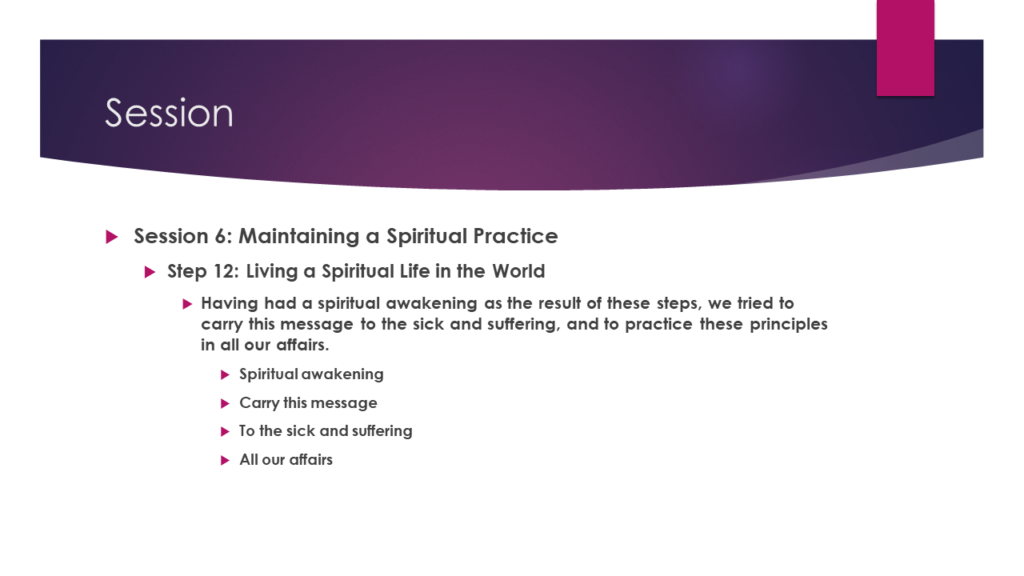
We’ve been given the spiritual gifts of integrity and self-esteem. They’ve come in the form of what traditionally have been called the gifts of the Spirit of God: wisdom, understanding, counsel, fortitude, knowledge, piety, and love of God. We retain these gifts so long as we can maintain our mindfulness. These spiritual principles and practices are not stop-gap measures to get us over a crisis or problem. They don’t work like a fad diet. They are a way of life. The characteristics of this way of life are three: acceptance of a higher power, God, and of reality as it is, surrender of our wills, our lives, and the outcomes of our plans and efforts to the care of God, and gratitude, which is the touchstone of our spiritual health. Whenever we find anything in our lives or any of our affairs that does not elicit gratitude from us, that’s something we need to work the steps on. That’s something that needs spiritual healing. We’ll know that we are spiritually alive and healthy if our only response to it all—easy or difficult—is gratitude.
There you have it. That’s the program and those are the principles. If you’ve not only followed along with these sessions but worked the steps along the way, you’ve probably sensed a change in your thoughts and attitudes. If you come away from this exercise with anything, I hope it would be that spirituality isn’t something on the periphery of life, but rather it’s at life’s core. Spirituality constitutes the essence of what human life is all about. There are many paths to spiritual growth, but I think you’ll find that all of them are made up of the principles and practices that you find in these twelve steps. May God support and guide you as you strive to practice them in all your affairs.
